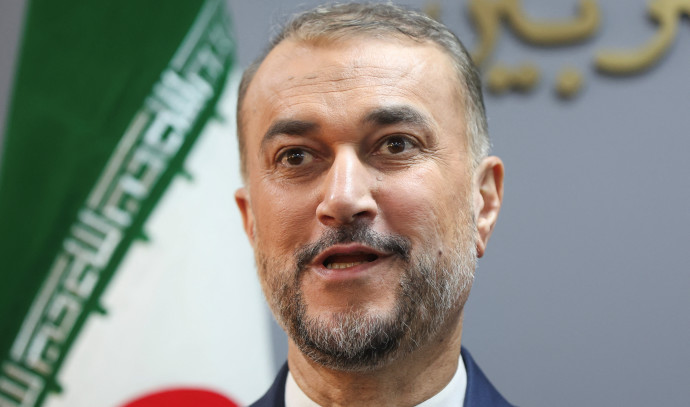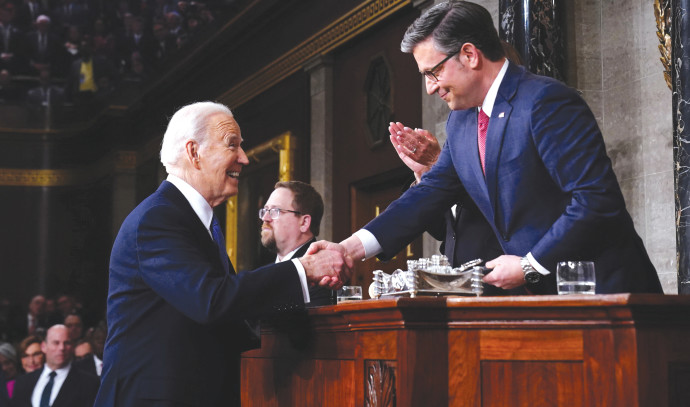world news
Is the US consulate in Jerusalem for Palestinians a real issue?

“US will force a Palestinian consulate on Israel,” a recent one read. “US will open the consulate to the Palestinians in Jerusalem after budget vote next month,” was another.
But the way sources in the Prime Minister’s Office and Foreign Ministry tell it, the accumulation of breathless headlines has sent them scrambling to find out where the information came from, because it is so different from what they’re hearing from Washington.
So, is everything OK between Jerusalem and Washington, or is a crisis on the way? The answer is complicated.
US Embassy Jerusalem (credit: US EMBASSY IN JERUSALEM)The structure in question, on Agron Street, is not only in Jerusalem, but on the western side of the city, which was part of Israel before 1967. Israel, under right-wing and left-wing governments, is not known to have raised objections to its operations; it was grandfathered in, existing since before the establishment of the state, and not worth a diplomatic spat with Israel’s greatest ally.
But now, in order to reopen the consulate to the Palestinians, Israel would have to give its approval – and this government does not plan to do so. Allowing consulates to a foreign entity in the middle of Israel’s capital would undermine sovereignty and the unity of Jerusalem, is the argument against it.
Asked about the consulate in The New York Times earlier this year, Prime Minister Naftali Bennett said: “Jerusalem is the capital of Israel. It’s not the capital of other nations.”
In later briefings, he told journalists that he unequivocally opposes opening a consulate to the Palestinians, in case the remark to the Times wasn’t clear enough.
Foreign Minister Yair Lapid, who would have to sign off on the consulate opening, also opposes it, though he doesn’t make a point of talking about it publicly. His aides generally make a more political argument, that it is a do-or-die issue for the right-wing parties in the unity government, and therefore cannot happen.
Justice Minister Gideon Sa’ar, the other signature required in order for Israel to approve the consulate, said at the Jerusalem Post Diplomatic Conference last week: “No way…. I want to make it very clear: We oppose it. We don’t oppose it now and have a different opinion after the budget. We are 100% opposed [to] that….
“Someone said it’s an electoral commitment [by Biden] – for us it is a generations commitment. Our commitment to Jerusalem is a generations commitment, and we will not compromise on this,” Sa’ar said, adding that Bennett agrees.
But hours later in Washington, US Secretary of State Antony Blinken said, as Lapid looked on, “We’ll be moving forward with the process of opening a consulate as part of deepening… ties with the Palestinians.”
Clearly, the sides don’t see eye to eye. Some kind of collision seems inevitable. The question is whether it will be managed quietly or a major flare-up.
Top Israeli diplomatic sources were emphatic that the issue has not adversely impacted the relationship with the Biden administration. Jerusalem made clear to Washington months ago that the consulate is a no-go, and while the sides disagree, the Biden administration is not putting pressure on Bennett and Lapid.
Washington has not brought up any alternative proposals for how to address the matter, and Jerusalem is not concerned that the Americans will violate the Vienna Convention on Diplomatic Relations by going forward with opening a consulate without Israel’s approval.
Though the consulate is omnipresent in the headlines, the sources denied that it is a central issue that has come up between Bennett and Biden or Lapid and Blinken; rather, it is a more peripheral one that US officials brought up briefly, not dedicating much time to it in their meetings.
Blinken’s latest remark on the consulate, one source pointed out, was in response to a question from the media. He didn’t bring up the issue publicly on his own, which could be an indication of where it stands on the secretary of state’s list of priorities.
“The topic hasn’t been coming up,” another senior diplomatic source said.
Rather, the source pointed to Likud MK Nir Barkat, who has announced his intention to run for the party’s leadership after opposition leader Benjamin Netanyahu retires, as a source of a lot of the tensions. Barkat, who never spoke out against the extant consulate in his 10 years as former mayor of Jerusalem, went to Washington twice this year to lobby Congress against reopening it.
“Barkat is trying to heat things up and is doing damage, and then Netanyahu picked up the shiny new toy,” tweeting against the consulate last week, the source said. “It’s okay to run a campaign based on foreign affairs issues, but don’t cause damage with it.”
Barkat responded that “the US government is working hard in recent months to open a Palestinian embassy in Jerusalem. It is unfortunate that Prime Minister Bennett is trying to hide from the Israeli public the Americans’ intention to open a Palestinian consulate in Jerusalem, for the first time since the establishment of the state… giving a precedent by which dozens of Palestinian consulates will be opened in the heart of Israel’s capital. Burying your head in the sand is not a solution, and the prime minister of Israel is expected to defend the capital of Israel.”
And the Palestinians, of course, bring up the topic often. One American diplomatic source said earlier this year that the consulate is the Palestinian Authority’s No. 1 ask from Washington.
Multiple sources flat out denied the report in Axios this week that there is going to be a task force led by Blinken and Lapid to work out the issue. The top diplomats agreed to further discuss the matter, but didn’t discuss any official structure or time frame to talk.
Of course, there is the fact that the budget vote is on November 4, and the pervasive view seems to be that some of the more contentious issues domestically and internationally – like the consulate – are lying in wait until after that date.
There is disagreement within the ranks of the Bennett-Lapid government about the significance of the budget vote to the consulate issue, though it must be said that no one said there will be a change in policy next month.
A minister who has spoken with American officials recently quipped that they all seem to have become experts on the Israeli budget.
One senior source said “the budget time frame is a general thing we say to everyone about everything.”
But another source said “the budget thing is fake news. The Americans told us it’s not their talking point. It’s spin, maybe from Barkat.”
Communications Minister Yoaz Hendel was in Washington this week, where he met senior American officials dealing with the Middle East and national security, in addition to communications, and his remarks seem to sum up where the situation stands. He brings up the situation, not the Americans, but they have the impression that something might change next month.
“I raise the Israeli approach on the consulate everywhere,” Hendel said on Thursday. “I try to explain it’s not just about the budget; it’s a matter of principle. Jerusalem is the capital of Israel. I’m not familiar with other examples of consulates and embassies in the same capital.”
Still, he made sure to add: “I’m sure our deep friendship will allow for the [consulate proposal] not to come to fruition.”
Asked if the Americans are insisting that the consulate was Biden’s campaign promise, Hendel seemed to have the key for how Jerusalem and Washington can live with disagreeing.
“We had other examples of strong promises from the past. I would like to remind you that for many years, many administrations promised before elections that they would transfer the embassy from Tel Aviv to Jerusalem, and they postponed it every time,” he said.
For 23 years, Israel lived with the US not enacting the Jerusalem Embassy Act, not keeping its promise to an ally. Now, the Bennett-Lapid government hopes, the Palestinians will just have to live with the same.
world news
Iranian FM: Israeli weapons are ‘toys for our children to play with’

Iranian Foreign Minister Hossein Amir-Abdollahian joked a day after Israel’s strikes in Iran that the weapons used were “more like toys that our children play with – not drones,” according to a Saturday article from Iran’s semi-official Mehr News Agency.
Making the comments in an interview with NBC News, Abdollahian said “As long as there is no new adventurism by Israel against our interests, then we are not going to have any new reactions.”
Threats against Israel
“If Israel takes a decisive action against my country and this is proven to us,” he said, “our response will be immediate and to the maximum and will cause them to regret it.”
The foreign minister went on to threaten that his comments were only a warning, and that “We could have hit Haifa and Tel Aviv… We could have also targeted all the economic ports of Israel.”
Abdollahian said that the only reason that Iran had not successfully hit Haifa, Tel Aviv or any major port was because Iran’s “red lines [were] civilians…We only had a military purpose.”
A 7-year-old Arab girl was killed during Iran’s mass drone attack which saw hundreds of UAVs and multiple ballistic missiles fired seemingly randomly at Israel. While few Iranian aerial assault weapons successfully hit Israel, one hit a northern Arab village and one hit Arad- which is where the 7-year-old girl was killed.
world news
White House urges Congress to quickly send foreign aid bill to Biden’s desk

Passing the national security supplemental bills would send a powerful message about the strength of American leadership at a pivotal moment, the White House Office of Management and Budget said in a statement released Friday morning as the House continues debates on rules for proceeding with the bills.
The supplemental funding package provides long overdue funding to support Ukraine as it continues defending itself against Russia’s brutal war of aggression. Ukraine must prevail, the White House said.
This supplemental funding also helps Israel protect its people against Hamas and Iran and its other proxies, including Hezbollah.
The White House’s statement
“It is critical that we quickly help Israel replenish its air defenses following Iran’s recent brazen and unprecedented attack and ensure Israel maintains its military edge against Iran or any other adversary,” according to the statement.
The funding would also provide urgent life-saving humanitarian assistance for Palestinian civilians in Gaza and vulnerable people suffering around the world, the statement said, as well as critical support to Indo-Pacific partners.
“The world is watching what the Congress does,” the White House said. “The Administration urges both chambers of the Congress to quickly send this supplemental funding package to the President’s desk.”
world news
American money ear-marked for PA security used to pay families of terrorists from Jenin – report

The Palestinian Authority’s General Security Service (GIS) has apparently admitted to using American money earmarked for security to pay the family of terrorists from Jenin, according to a Palestinian Media Watch report.
According to the report, on April 4, 2024, PA news agency WAFA published that the GIS in Jenin had given a grant to “the families of the Martyrs and the prisoners from the service’s ranks in the district.”
The GIS gave grants to around 36 families from among the “martyrs and prisoners.”
The vast majority of those identified as “martyrs” or “prisoners” were members of the GIS who had committed acts of terror, according to the PMW.The grant was given at the direction of PA General Intelligence Chief Majed Faraj, who emphasized a core principle of Mahmoud Abbas: “If we are left with one penny, it will be paid to the families of the Martyrs and the prisoners.”
Taylor Force Act
The US had all but ceased providing funds for the PA after the implementation of the 2017 Taylor Force Act, which blocked all funding for the PA general budget.
The act was named for Taylor Force, an American citizen killed in a terror attack in 2016, where the attacker’s family received money from the PA’s pay-for-slay program.
The exception to this was the funding of the PA’s security sector, which received around $45 million in 2022, according to the State Department’s website.
The PMW says that this money was then used to not only provide funds for terrorists and their families but also to train PA security forces, many of whom end up involved in terrorism, according to PA statements in 2023.
The PMW charge that US funds are now being used to directly fund and train terrorists in the West Bank.
-

 Camera3 years ago
Camera3 years agoCharles ‘Chuck’ Geschke, co-founder of Adobe and inventor of the PDF, dies at 81
-

 TOP SCEINCE2 weeks ago
TOP SCEINCE2 weeks agoInherited predisposition for higher muscle strength may protect against common morbidities
-

 TOP SCEINCE2 weeks ago
TOP SCEINCE2 weeks agoBrightest gamma-ray burst of all time came from the collapse of a massive star
-

 TOP SCEINCE2 weeks ago
TOP SCEINCE2 weeks agoStellar winds of three sun-like stars detected for the first time
-
world news2 weeks ago
Jewish diaspora expresses concern as Iranian drones launch toward Israel
-

 Camera3 years ago
Camera3 years agoSony a7 IV sample gallery
-
world news5 months ago
Gulf, France aid Gaza, Russia evacuates citizens
-

 TOP SCEINCE1 week ago
TOP SCEINCE1 week agoPlastic pollution can kill variety of ocean embryos

